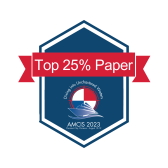Loading...
Paper Type
Complete
Description
Creativity is a key area of organizational growth, and teams are often tasked with complex problem-solving issues. As organizations increasingly lean on online collaboration, important questions on the effects of remoteness have arisen. Research is in the infancy of uncovering the mechanisms that articulate different outcomes between online and in-person teams. While the focus has been on cognitive processes, affective states also influence creative thinking. In this study, we conduct a laboratory experiment with online vs. in-person dyads who are placed in convergent or divergent moods using mood induction. We observed that (i) online teams produced fewer ideas than in-person, (ii) teams with convergent moods elaborate on their ideas more than their divergent counterparts, and (iii) online teams with divergent moods produced ideas with the least originality. This study has important implications for the design of modern workplaces.
Paper Number
1902
Recommended Citation
Saigot, Maylis; Gleasure, Rob; Constantiou, Ioanna; and Blicher, Andreas, "In or Out of Sync? A Psychophysiological Approach to Understanding Creative Collaboration in Online and In-Person Teams" (2023). AMCIS 2023 Proceedings. 9.
https://aisel.aisnet.org/amcis2023/sig_core/sig_core/9
In or Out of Sync? A Psychophysiological Approach to Understanding Creative Collaboration in Online and In-Person Teams
Creativity is a key area of organizational growth, and teams are often tasked with complex problem-solving issues. As organizations increasingly lean on online collaboration, important questions on the effects of remoteness have arisen. Research is in the infancy of uncovering the mechanisms that articulate different outcomes between online and in-person teams. While the focus has been on cognitive processes, affective states also influence creative thinking. In this study, we conduct a laboratory experiment with online vs. in-person dyads who are placed in convergent or divergent moods using mood induction. We observed that (i) online teams produced fewer ideas than in-person, (ii) teams with convergent moods elaborate on their ideas more than their divergent counterparts, and (iii) online teams with divergent moods produced ideas with the least originality. This study has important implications for the design of modern workplaces.
When commenting on articles, please be friendly, welcoming, respectful and abide by the AIS eLibrary Discussion Thread Code of Conduct posted here.




Comments
SIG CORE